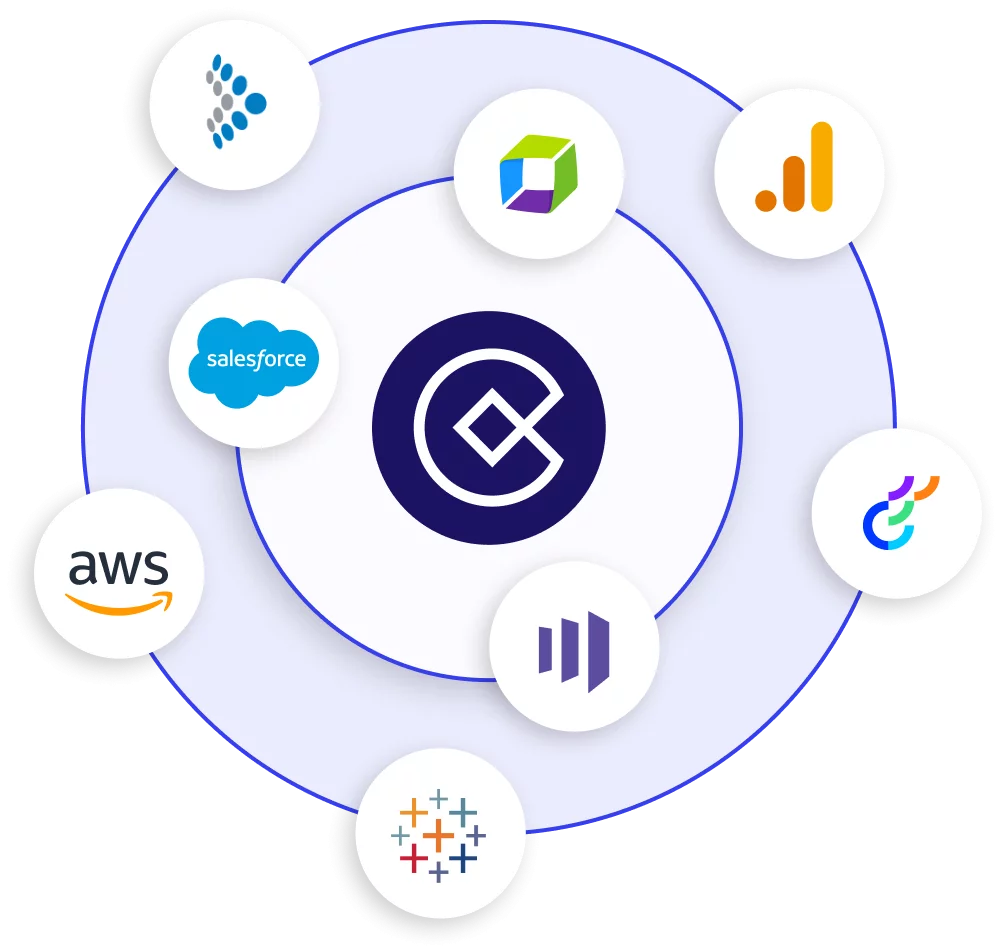
Integrations & APIs
A brain for your martech stack
Use our pre-built integrations to maximize your value with your web analytics, Voice of Customer, application performance monitoring, personalization engines and other systems in your marketing tech stack.
Or use our APIs to integrate Contentsquare with any third party system or to configure more innovative user experiences and workflows that tailor-fit your team's preferences

Digital experience analytics APIs
Enable digital experience innovation
Leverage scalable RESTful APIs that enable digital experience innovation by allowing outside web applications and enterprise software to interface with all metrics. Use APIs to configure workflows to meet the needs of your business.

A/B testing and personalization integrations
Optimize the performance of A/B tests
Inform your test strategy to identify the experiences most likely to create uplift. Understand how exposure to A/B test variations and personalizations impacts behavior both on the page and the journeys beyond. See why one version performs better and discover how to create even better tests.

Web analytics integrations
Integrate your entire web analytics stack for greater insights
Import pre-built customer segments from Adobe Analytics, Google Analytics, and Google Analytics 360 to visualize their experiences in Contentsquare. Answer questions that neither system could answer on its own.

Voice of Customer and application performance integrations
Discover customer experiences which led to feedback
Click into Contentsquare from your VoC or Application Performance Monitoring solution and replay the exact sessions leading up to feedback and issues. Quantify the impact and compare the behavior of visitors that rated experiences highly or poorly side-by-side.
Most common use cases
- 01 Smarter customer engagement
- 02 Faster implementation and scale
- 03 Build bespoke experiences for your team
Smarter customer engagement
Share intelligence across your martech stack for deeper insights and smarter execution.

Faster implementation and scale
Pre-built integrations that are quick to implement, helping you save time and resources and allowing you to get into market more quickly.

Build bespoke experiences for your team
With APIs, you can configure both workflows and the UI to your specific team needs.

Customer Journey Analytics in action
How Leeds Building Society used Customer Journey Analytics to improve conversion rate on key product pages by 80%
Read the full story View all case studies >>
"
Contentsquare gives us the ability to have a 3D-view of the data that comes from platforms like Google Analytics and our testing tool.
Contentsquare is the bridge between them."


Steve Thompson
Head of User Experience
Dune (UK)
Frequently asked questions
-
An analytics tech stack is a combination of tools and technologies used for collecting, processing, and analyzing data. It typically includes data storage, processing, visualization, and reporting tools that work together to provide comprehensive insights into various aspects of business performance.
-
A robust analytics tech stack benefits businesses by enabling them to make informed decisions based on data-driven insights. It streamlines the data pipeline, ensuring efficient data collection, processing, and analysis. This empowers organizations to optimize strategies, enhance operations, and stay agile in a competitive landscape.
-
Essential components in an analytics tech stack include a data warehouse for storage, ETL (Extract, Transform, Load) tools for data processing, and analytics and visualization tools for generating actionable insights. The integration of these components creates a seamless flow of data, facilitating effective decision-making within the organization.
-
Data integration is critical in an analytics tech stack because it ensures that disparate data sources can be harmonized and analyzed cohesively. Integrating data from various systems and channels provides a holistic view, allowing businesses to derive meaningful correlations and insights that might be missed with isolated data sources.
-
Businesses can scale their analytics tech stack by adopting scalable and flexible technologies. Cloud-based solutions, scalable databases, and modular analytics tools allow organizations to adapt their tech stack to evolving data needs and increasing volumes. This scalability ensures that the analytics infrastructure can grow with the business.
-
Ensuring the security of an analytics tech stack involves implementing robust data governance practices, encrypting sensitive information, and regularly auditing access controls. By prioritizing data security, businesses can mitigate risks and build trust in their analytics capabilities, fostering a secure and compliant data environment.